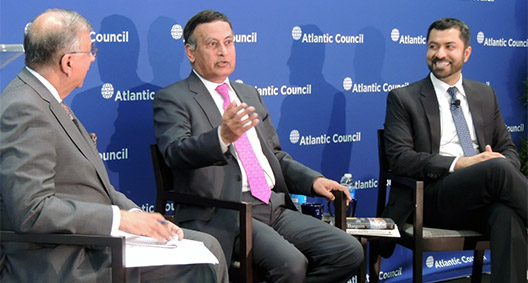 Political Islamists, as they currently operate in Pakistan, are “likely to divide our society, break it apart, and cause more violence,” warned Former Pakistan Ambassador of Pakistan to the United States Husain Haqqani. He contended that political Islamists have replaced anthropological and sociological explanations of Islam with “a puritanical formation of Islam, which is essentially totalitarian, inherently violent, and very intolerant.” Haqqani, speaking at an Atlantic Council South Asia Center event urged for a more honest evaluation of Pakistan’s own history, suggesting that as it is interpreted now, Pakistan’s history is “totally mired in myths.”
Political Islamists, as they currently operate in Pakistan, are “likely to divide our society, break it apart, and cause more violence,” warned Former Pakistan Ambassador of Pakistan to the United States Husain Haqqani. He contended that political Islamists have replaced anthropological and sociological explanations of Islam with “a puritanical formation of Islam, which is essentially totalitarian, inherently violent, and very intolerant.” Haqqani, speaking at an Atlantic Council South Asia Center event urged for a more honest evaluation of Pakistan’s own history, suggesting that as it is interpreted now, Pakistan’s history is “totally mired in myths.”
Also speaking at the event, Haroon Ullah, member of US Secretary of State John Kerry’s Policy Planning Staff, directed attention to three such myths about political Islam, each preventing better governance in Pakistan and a stronger relationship with the United States. Firstly, violence is strategic. Political Islamists utilize violence as “very powerful signaling mechanism” to instill fear and meet their goals, which include securing votes. Secondly, democratization does not necessarily lead to moderation. The winner-take-all system in Pakistan’s elections enable smaller parties to hold a disproportionate sway in the country’s politics, as they often serve as the swing vote between major parties. In fact, Ullah argued, Islamic parties “stay stronger by staying smaller.” Islamists recognize and exercise this role—they are driven by pragmatism, rather than ideology alone. Lastly, poverty does not drive militancy. Instead, Ullah urged policymakers to pay attention to the thin middle class, often a target recruitment constituency, consisting of relatively urban, educated individuals.
Haqqani contended that “while political Islamists can be a part of the political landscape of any Muslim country and probably will be,” the nature in which Pakistan’s organizations have dominated the national political discourse is problematic to the future of the country. Islamists are “veto-wielders” who “hold a sway in Pakistan totally disproportionate to their numbers.” However, this is not a new phenomenon, Haqqani argued, but rather at the core of the country’s origins. At its formation, Islamists demanded provisions in the country’s constitution, defining what it means to be an Islamic state. This role was further defined through the establishment of Islamic laws, and now, Islamists vehemently oppose overturning these laws even by a parliamentary majority. The Islamists have “usurped the Pakistani national discourse,” said Haqqani, meaning a “rational political argument is no longer possible.”
Despite Haqqani’s grim outlook, Ullah remained optimistic that clarity can provide progress—though both agreed that the change must come from within Pakistan. “This is a critically misunderstood phenomenon in a critical relationship.” Working to understand Pakistan’s political Islamic parties will facilitate necessary engagement, diplomatically and otherwise, and “provide the perfect crucible to look at religious political parties [worldwide] that use ideologies and religious symbolism to mobilize.”
